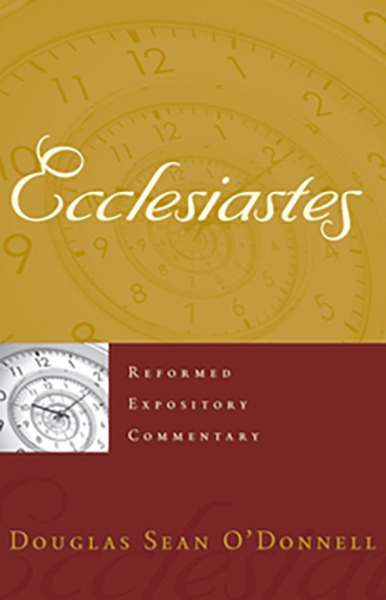
Douglas Sean O’Donnell
Reviewed by: Danny E. Olinger
Ecclesiastes, by Douglas Sean O’Donnell. P&R, 2014. Hardback, 248 pages, list price $22.99. Reviewed by New Horizons editor Danny E. Olinger.
Although the writing of commentaries on the book of Ecclesiastes has seemingly been without end in recent years, Douglas Sean O’Donnell’s Ecclesiastes in the Reformed Expository Commentary series is to be commended. O’Donnell makes the case that the problem that the Preacher in the book of Ecclesiastes—called “Pastor Solomon” by O’Donnell—addresses is life in a fallen, sin-cursed world. Wisdom cannot change the reality that God has faithfully carried out his promised punishment upon Adam and his seed for Adam’s transgression. O’Donnell writes, “Because of God’s curse on creation (the consequences of the fall recorded in Genesis 3:14–15 are assumed throughout), in all our endeavors we cannot find much meaning or sustainable joy in this world or present age. It’s vanity” (p. 9).
O’Donnell posits that the opening question of the Preacher, “What does man gain by all the toil at which he toils under the sun?” (Eccl. 1:3), and its implied answer, “Nothing,” provide an entrance into understanding the book as a whole. Death makes everything vain. But, if that is the case, how is one to live under the sun? All illusions of self-aggrandizement and all pretense of pride in this life must be abandoned. The answer is found in the Lord, in obediently trusting him (Eccl. 12:13).
O’Donnell helpfully adds that the goal of Ecclesiastes—trusting in the Lord and doing what he says—can only be reached by reading it through the lens of Jesus Christ. He writes that the way to read Ecclesiastes is to understand it as God’s wisdom literature that contains a unified message that makes better (but not perfect) sense in light of the crucified, risen, and returning Christ. In his death on the cross, Jesus redeemed us from the vanity that the Preacher wrestled with and suffered under. In his resurrection, Jesus restored meaning to our labor under the sun. In his return, Jesus will settle every injustice and elucidate all absurdity when he ushers those who fear the Lord into the glories of the living God.
God’s perfected wisdom is found in Christ, the wonderful counselor. Jesus is the divine resolution. He is the righteous one who conquered all unrighteousness through his death and resurrection, and, as such, he is the meaning of this life. As O’Donnell puts it, the lesson of Ecclesiastes is to turn from drinking out of broken cisterns that hold no water to drinking from the fount of living waters that is found in Christ. But, before one comes to the living waters that Christ offers, one must first walk through the waterless wilderness where the things of this creation, such as wisdom (Eccl. 1), pleasure and work (Eccl. 2), fame and power (Eccl. 4), wealth (Eccl. 5), and family and health (Eccl. 6) seek to satisfy. The only water that quenches one’s thirst forever is to drink from the Savior, the one in whom a spring wells up to eternal life.
November 09, 2025
November 02, 2025
October 26, 2025
October 19, 2025
October 05, 2025
Raising Sexually Faithful Kids and
Parenting Boys and Girls in a Gender-Confused World
September 28, 2025
Calvin’s Ecclesiology: A Study in the History of Doctrine
September 21, 2025
© 2025 The Orthodox Presbyterian Church